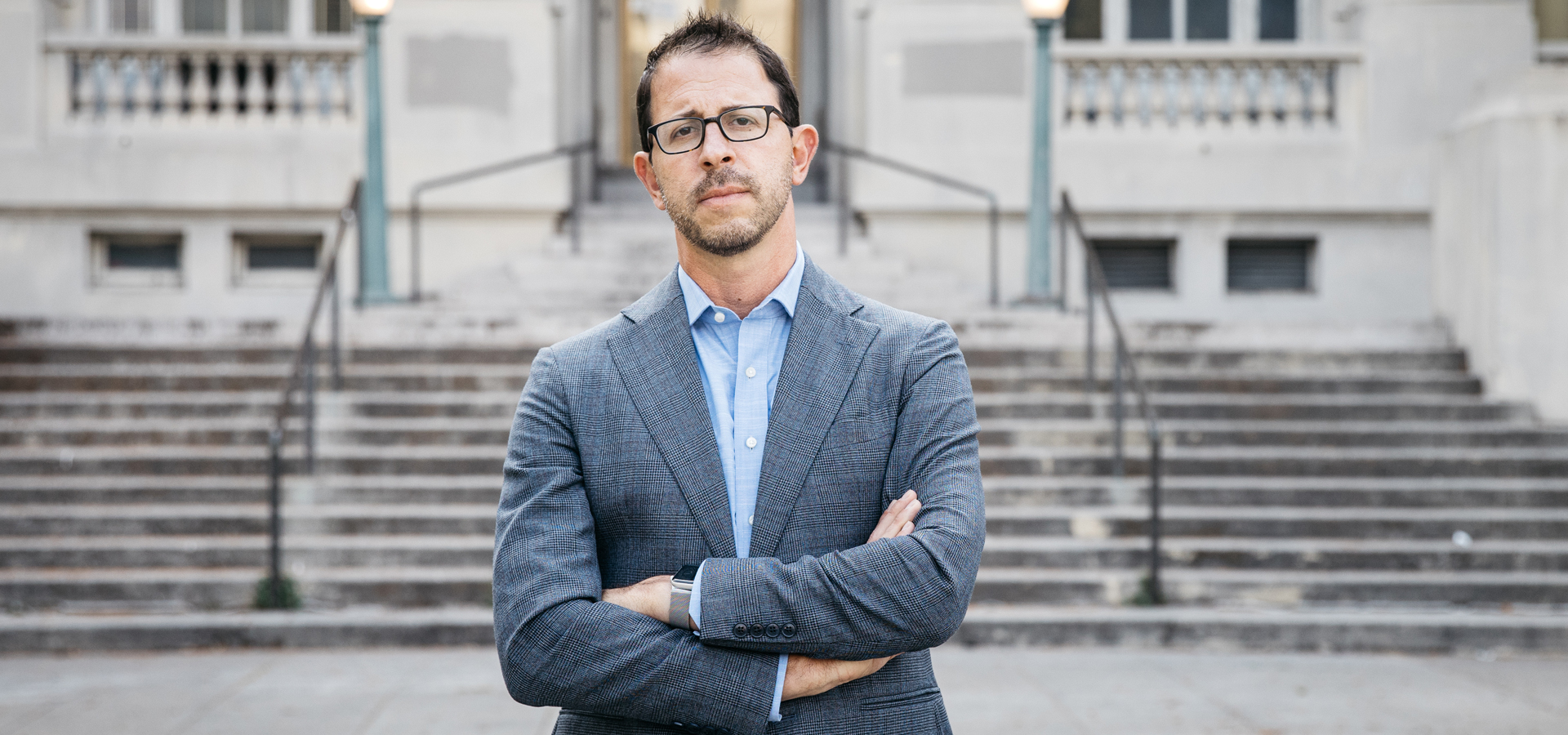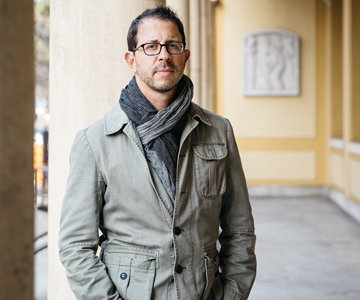In Defense of Democracy: Ian Bassin ’98

When he answered an out-of-the-blue phone call in autumn 2023 and learned he’d been awarded a MacArthur Fellowship—more casually called a “genius grant”—Ian Bassin ’98 was humbled, if a little puzzled. “I’d always associated [the MacArthur award] with being something that a biologist gets, or a cellist gets, or an abstract painter,” he says. “People who tend to work more or less as individuals.”
Bassin, meanwhile, is a lawyer, democracy advocate, and executive director of the nonpartisan nonprofit Protect Democracy, leading a staff of more than 100 lawyers, strategists, and other professionals in efforts to safeguard American norms and institutions from authoritarian abuses of power. But Bassin made peace with our culture’s tendency to shrink the work of many into a single person by understanding the award as the MacArthur Foundation’s way of spotlighting efforts to secure liberal democracy given the urgency of the moment as we enter a consequential presidential election year.
“We’re at the beginning of a year in which the survival of our democracy is in doubt,” he says, “and by the end of the year could be in existential peril.”
For nearly 30 years, Bassin has been shaped through political engagement. As a first-year student at Wesleyan he helped organize the Student Coalition to Save Financial Aid, garnering local headlines, raising money for need-blind admissions at Wesleyan, and executing a day of action against massive cuts to federal student aid that drew participation across more than 30 American college campuses. That experience prompted Bassin to expand his studies beyond English to encompass a double major in government. “I got a bug from being involved, in that we could actually make a difference being participants in our political system.”
Later, after graduating from Yale Law School, Bassin served as associate White House counsel during the first three years of the Obama administration. In training White House staff and officials to follow the rules governing executive branch behavior, Bassin knew intimately that key constraints on the presidency—like honoring the independence of the Department of Justice instead of weaponizing it to prosecute presidents’ political foes—were merely agreements passed between administrations. “So many of those rules are not legally binding: they’re just traditions, customs, and practices that depend on the good-faith implementation of the officials in office,” says Bassin, who grew up in New York City and served as deputy counsel in the New York City Mayor’s Office from 2014 to 2015.
As the 2016 presidential campaign played out, Bassin, who’d encountered Donald Trump via his 1980s New York tabloid exploits, feared the Republican nominee would shred those fragile norms once in office. “If anyone [else] had been elected, from Bernie Sanders on the left to Ted Cruz on the right, this would’ve been fundamentally different in kind,” Bassin says. “[Trump] is not someone who was on the extreme left or extreme right. This was someone from a whole different ideological background altogether, someone who didn’t believe in democracy, who had much more in common with the strongman autocrats we’ve seen in the 21st century around the world.”
Since its founding, Protect Democracy has used a range of strategies—litigation, legislative work, research and analysis—to serve as a watchdog on government officials, push back on disinformation, and safeguard elections.
From Viktor Orbán’s Hungary to Recep Tayyip Erdoğan’s Turkey to Nicolás Maduro’s Venezuela, authoritarianism has been ascendant; in 2023, the think tank Freedom House tallied 17 consecutive years of global declines in political rights and civil liberties. To help protect and strengthen American institutions against similar outcomes, in early 2017 Bassin and other Obama administration alumni founded Protect Democracy, rapidly morphing into a cross-ideological cohort of conservatives, moderates, and progressives.
“Our staff includes people who disagree about many of the political issues that in a normal, healthy moment for our democracy would be decided by elections and legislative votes,” Bassin says, “but they are united in the view that we need to defend the foundations of American democracy right now, so that we can resolve those other political disagreements peacefully through the normal political process.”
Since its founding, Protect Democracy has used a range of strategies—litigation, legislative work, research and analysis—to serve as a watchdog on government officials, push back on disinformation, and safeguard elections. Its VoteShield election-monitoring software has helped both Republican and Democratic state and local election administrators monitor changes in voter registration data that could be signs of unauthorized access or clerical error. Through its Law for Truth project, Protect Democracy has represented victims of conspiracy theories in defamation suits (it recently represented two Georgia election workers in a case that resulted in a $148 million verdict against Rudy Giuliani), and has represented Capitol police officers harmed on January 6, 2021. The group helped organize the National Task Force on Election Crises, which proposed reforms to the Electoral Count Act—central to the January 6 maelstrom—that were signed into law in 2022. The organization also continues to advocate for structural changes including proportional representation, which could move politics away from two-party, winner-take-all customs and increase the range of political views and constituencies reflected in American government.
But ahead of the next election, as pundits warn about novel threats like AI-generated propaganda and new state-level voting restrictions, Bassin thinks back to something that Agnieska Pomaska—a Polish lawmaker who stood against the country’s recently ousted illiberal Law and Justice party—voiced at a Protect Democracy summit in 2017: don’t let the pro-democracy coalition fracture. In other words, when those who value democratic systems fail to unite in their defense, extremists can seize power and dismantle them without majority support.
That risk remains the greatest threat in 2024, Bassin says. “It’s clear that more than 50 percent of this country wants to maintain a constitutional representative democracy in the United States. If that coalition unites behind the one candidate that stands a chance of defeating the autocrat who’s running to return to power, then democracy will make it through this election,” Bassin says. “But if that coalition fractures and splits between independent and third-party voters, or sits the election out, then authoritarianism will prevail.”



